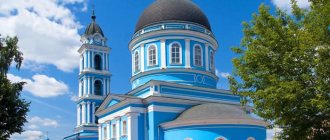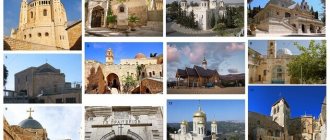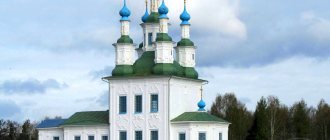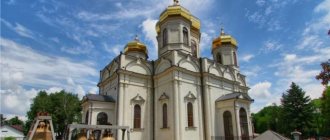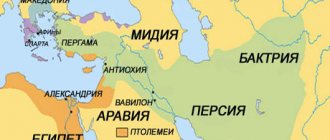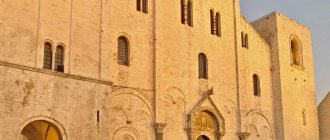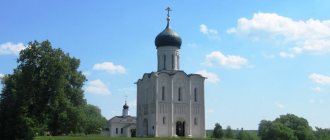Christian pilgrimage and modern tourism: history and modernity of pilgrimage.
The modern word “pilgrim” goes back to the Old Russian “palmovnik”, which, in turn, is derived from the Latin palmarius (“a person holding a palm branch”). This is what the pilgrims - participants in the religious procession in the Holy Land - were originally called. Those who sought to celebrate the Holy Resurrection of Christ in Jerusalem came in advance to spend the entire Holy Week in the Holy City. And since Holy Week is preceded by the holiday of the Entry of the Lord into Jerusalem (otherwise this holiday is also called Vai Week, or in the Russian Orthodox tradition - Palm Sunday), and the main event of this day was the religious procession to the walls of Jerusalem, the pilgrims who took part in this procession, carried palm branches. Almost two thousand years ago, the inhabitants of Jerusalem greeted Christ with the same branches. As a rule, in addition to various relics, pilgrims took these palm branches home with them as souvenirs.
Subsequently, pilgrims began to be called pilgrims traveling not only to Jerusalem, but also to other Christian shrines.
Is it necessary to make pilgrimages?
If a Christian has never been anywhere outside of his city or village, he is not somehow wrong and is not deprived of anything. There is no need to reproach him for this. Today they like to make pilgrimages to the place of the exploits of St. Seraphim of Sarov. But the Monk Seraphim himself was nowhere further than Kyiv. He took a blessing there for his upcoming monasticism and settled for the rest of his life in a deep forest, where there were no shrines or temples. There he built a wooden church and with his own life sanctified those deserted places, so that people began to flock there and a monastery arose. It is not the place that sanctifies the person, but the person who sanctifies the place.
Of course, pilgrimage is a good thing, but you don’t necessarily have to drop everything and hit the road. The most important thing is not how many holy places we visited, how many relics and icons we managed to visit, but our faith, how familiar we are with the Gospel, the apostolic epistles and whether we embody their words in our lives. For a Christian, the most important thing is to live according to the Gospel and the teachings of the apostles.
Read also: Why do children need to learn poetry by heart?
A little history
The pilgrimage was known long before the Coming of Christ. The Old Testament tells of the Jews' journey with the Tabernacle and later to the Temple in Jerusalem. Jewish believers made a pilgrimage to the Temple every year for the holidays. The Gospel also tells about this, how the Mother of God, according to the Law of Moses, came to the Temple with Joseph and the Infant Christ to make an atoning sacrifice for sin. Later, She, Joseph, and twelve-year-old Christ went to Solomon's Temple for a festival, where He became lost.
Despite the mortal danger, the Apostle Paul made a pilgrimage to the Temple. There he was captured and taken into custody.
History tells that the first Christians also had the custom of pilgrimage to holy places associated with Christ. Even in the fourth century AD, Saint Gregory of Nyssa testifies to this, but also warns that these trips should not turn into idle pastimes.
In the Middle Ages, Orthodox Christians began to make pilgrimages not only to the Holy Land, but also to Mount Athos. Among Catholics, pilgrimages were divided into small (in their locality) and large (to Rome, to the House of Our Lady of Loreto, etc.). Catholics had special outfits when making a pilgrimage, by which they could be recognized: a gray cloak, a wide-brimmed hat with a large cross .
How to treat the so-called rites of exorcism in some monasteries?
It happens that a pilgrim, arriving at a monastery and wanting to attend a divine service, finds there not a liturgy or vespers, but a “rite of exorcism.” Someone thinks that it would not hurt him to attend this service, and remains to pray during such a service. After all, there are passions in each of us... Here again is the wrong attitude towards spiritual life: a person wants to change without changing anything about himself.
What is demonic possession? Each of us has passions. When we follow them, we give the demons the opportunity to enslave us. This can take extreme forms - when a person cannot control his body himself and it is in the power of evil spirits. It is not useful and even spiritually dangerous for non-possessed people to attend such “ranks.” This can even lead to mental illness.
We get rid of sin only when we defeat it within ourselves through our own efforts and the power of God and replace sin with virtue. The Savior said that this race can only be driven out by fasting and prayer (Mark 9:29). A person himself must change with the help of home and church prayer, the sacraments of Confession, Communion, and work on himself.
We cannot simply get rid of sin, such as bad thoughts. They need to be replaced with good thoughts. If we don't do this, the evil thoughts will return. There can be no emptiness in our life. We must replace every repressed sin with virtue. The psalmist says: “Turn away from evil and do good” (Ps. 33:15). When we want to do something bad, we need to force ourselves to do a good deed, and not go somewhere to have some special prayers said over us.
The path for the elite or the path for all?
Often a person goes on a pilgrimage, hoping in this way to receive something special, to touch a special grace. When a person just comes to faith, he can meet advisers who will recommend to him: “Be sure to go there and there,” as if there is a special presence of God somewhere, and something special can happen to a person there.
I believe that you don’t need to go anywhere to meet God and receive His grace: we have churches that contain the Body and Blood of Christ - the greatest shrine on earth, icons and relics of saints, the Holy Scriptures and the commandments of God. God has no division between chosen people who have visited special places, to whom He reveals some secrets, and “ordinary” people. The Lord gave everyone everything necessary for salvation.
To visit a great or little-known shrine, to pray, to take part in a divine service performed by the monastic rite is a good deed. Many people like to spend their holidays on pilgrimage. This helps to unwind, see how Christians live in other cities and countries, and gives the opportunity to pray at shrines.
Today people often step over the healthy line of venerating a shrine and forget about Christ. They know many different saints who help with certain specific things, but they know nothing about God. They even remember some little-known elders and their covenants, but they absolutely do not remember what is written in the Gospel and the Apostolic Epistles.
On the feast of St. Nicholas the Wonderworker there are often more people in the church than on any feast of the Lord or Sunday. People strive to receive good luck from the saints, help in some of their affairs, and come to the church as an organization that provides this. The desire for everything to be fine in life, for no one to get sick, is a normal human desire. But the Lord founded the Church for the salvation of souls. And salvation comes through personal change.
Israel pilgrimage
The main pilgrimage in all centuries is the pilgrimage to the Holy Land, to Jerusalem, to the places of Christ’s earthly life. Most pilgrimages take place on Orthodox Easter. On Holy Saturday, the miracle of the descent of the Holy Fire takes place here. This is truly a miracle that people expect every year with faith and hope. Its meaning is the self-ignition of the lamp on the Holy Sepulcher in the presence of the Patriarch of Constantinople. They prepare for the Holy Saturday service in advance, but no one knows at what hour the Holy Fire will descend. According to legend, one year he will not appear, and this will mean the onset of the end times, the End of the World. Every year, on Saturday morning, the Ecumenical Patriarch with a retinue of clergy enters the Church of the Resurrection of Christ and undresses himself down to his white cassock in its center, at the Chapel of the Holy Sepulcher (Edicule), which stands above the very place where Christ was resurrected, above the Stone of His Sepulchre. All light sources in the temple are extinguished - from lamps to chandeliers. The Patriarch, according to the tradition that emerged after the Turkish rule in Jerusalem, is searched for the presence of anything that would contribute to the ignition of the Fire. The sacristan brings into the Edicule cave a lamp, which is placed in the middle of the Holy Sepulcher, and the same torch of 33 Jerusalem candles. As soon as the Orthodox Patriarch enters there, accompanied by the Primate of the Armenian Church, the cave with them is sealed with wax. Pilgrims fill the entire temple - the words of prayers are heard here, the confession of sins takes place in anticipation of the descent of the Fire. Typically this wait lasts from several minutes to several hours. As soon as flashes of lightning appear above Edicule, signifying the Convergence, a bell rings above the temple. Many millions of people over the centuries have witnessed this miracle, because even today scientists cannot explain with anything other than God’s power the flashes of lightning in the temple on Holy Saturday.
Mecca for Muslims
In Islam, pilgrimage is a hajj to places where you can worship Allah collectively and perform namaz. Mecca is the place where the prophet was born. This place is the spiritual center of all Muslims of all Islam.
According to tradition, the pilgrimage to Mecca lasts ten days. Believers prepare for this event in advance. There are many rules for Hajj that a believer must take into account. Thus, a young man can go on a religious journey independently at the age of 18, and girls and women under the age of 45 have the right to visit a holy place only when accompanied by a man: husband or relative. Moreover, they must document their relationship to the Spiritual Administration of Muslims at their place of residence.
In the Kingdom of Saudi Arabia, where pilgrimages to Mecca and Medina are held (these shrines are located on the territory of the country), strict Sharia rules apply. The airport has strict screening procedures for every arriving guest.
The pilgrimage to Mecca is carried out under the supervision of experienced guides. Even if believers do not arrive as a group, but on their own, they are assigned to the care of accompanying persons. All institutions in the country are open from eight in the morning to twelve in the afternoon and from five to seven in the evening. Closed days are Thursday and Friday. The kingdom has its own calendar, according to which the current year is 1438 Hijri (2017 AD).
Pilgrimage in Rus'
Pilgrimage in Rus' was a very dangerous business in ancient times and therefore especially revered. The fact is that believers walked to the Holy Land. The path was not easy and life-threatening. Sometimes the provisions ran out too early. Many died on the way from hunger and cold, sometimes from overwork. Sometimes they became victims of robbers, evil people.
Believers sometimes made a vow to make a pilgrimage to the Holy Land while fulfilling what they asked of God . This occupation was considered “holy”; pilgrims, or otherwise “wanderers”, were respected and accepted into every home. It was considered a special matter to receive and feed strangers. Pilgrims gathered in groups (dozens) and traveled together. It was safer that way.
Sometimes foreign church authorities disapproved of pilgrims and took measures to curb pilgrimage. But the Russian wanderers won a victory in this regard.
During the reign of Catherine II, pilgrimages to the Holy Land were suspended due to wars with Turkey. But already in the nineteenth century it began to spread freely again.
Even the Orthodox Palestine Society was created.
Should it be difficult for a pilgrim?
There is no need to rejoice at the troubles that happened on the road, to believe that thanks to them the pilgrimage will certainly be beneficial. If we can perceive some difficulties with peace in our souls, that’s good. This is humility. But this does not mean that we do not have the right to normal sleep, rest, and food intake and should rejoice in the absence of this. And deliberately turning your life or the lives of those around you into some kind of incomprehensible suffering, for example, by reading long prayers instead of sleeping, is simply fanaticism.
Some people deliberately go on a pilgrimage to work hard - to help some monastery. Working and enduring hardships for the sake of others is, on the contrary, a good and godly deed. Such a pilgrimage is called labor. However, you should not do this to the detriment of your family and household affairs. If you manage to do everything at home, then you can safely go to obedience.
Pilgrimage to Saint James and Saint Jacques in Spain
The relics of Saint James, brother of John the Theologian, are especially revered in Spain. He preached in those places, following the wine route from Jerusalem (which is why he is revered as the patron saint of travelers and pilgrims). According to legend, after he was killed by Herod, his body was carried in a boat to the bank of the Ulya River. Now here is the city named after him, Santiago de Compostela. In 813, one of the Spanish monks received a sign of God: a star, with its light showing the burial place of the relics of Jacob. The name of the city built on the site of their discovery is translated from Spanish as “Place of St. James, designated by a star.”
From the 10th century, a pilgrimage began here, which by the 11th century acquired the significance of the second pilgrimage in status after visiting Jerusalem. Ancient pilgrimage traditions are still observed today: the pilgrim must reach the city on foot, walking for one hundred kilometers or pedaling a bicycle for two hundred kilometers.
God bless you!
Countries[edit]
Abkhazia * Australia * Austria * Azerbaijan * Albania * Algeria * Angola * Andorra * Argentina * Armenia * Afghanistan * Bahamas * Bahrain * Belarus * Belize * Belgium * Benin * Bulgaria * Bolivia * Bosnia and Herzegovina * Botswana * Brazil * Burkina Faso * Burundi * Vatican * Great Britain * Hungary * Venezuela * East Timor * Vietnam * Gabon * Haiti * Ghana * Guatemala * Germany * Greece
* Georgia * Denmark * Dominican Republic * Egypt * Zimbabwe *
Israel
* India * Indonesia * Jordan * Iraq * Iran * Ireland * Iceland * Spain * Italy * Kazakhstan * Cambodia * Cameroon * Canada * Kenya
*
Cyprus * Cyprus (Northern) * Kyrgyzstan * China * Colombia * Congo * Korea (North) * Korea (South) * Kosovo * Costa Rica * Cuba * Latvia * Lebanon * Lithuania * Liechtenstein * Luxembourg * Mauritius * Madagascar * Macedonia * Malta * Morocco * Mexico * Moldova (Moldova) ) * Monaco * Mongolia * Nigeria * Netherlands * New Zealand * Norway * United Arab Emirates * Pakistan * Palestine * Panama * Papua New Guinea * Paraguay * Peru * Poland * Portugal * Russia * Romania *
San
Marino * Serbia * Syria * Slovakia * Slovenia * United States of America * Tajikistan * Thailand * Tanzania * Tunisia * Turkmenistan * Turkey * Uganda * Uzbekistan * Ukraine * Uruguay *
Philippines
* Finland * France * Croatia * Montenegro * Czech Republic * Chile * Switzerland * Sweden * Ecuador * Estonia * Ethiopia * South Africa * Japan
Orthodox churches and monasteries are marked on the map. The map is updated daily. Using our website you can build your pilgrimage route.
Orthodox churches and monasteries are marked on the map. The map is updated daily. Using our website you can build your pilgrimage route.
Monasteries[edit]
For a list of all 1530 monasteries available on the site, see here
.
The most famous Orthodox monasteries:
- Athos
- Valaam Spaso-Preobrazhensky Monastery
- Holy Trinity Lavra of Sergius
- Holy Dormition Kiev-Pechersk Lavra
- Optina Pustyn
- Pskov-Pechersky Monastery
- Holy Trinity Seraphim-Diveevo Monastery
- Spaso-Preobrazhensky Solovetsky Monastery
- Holy Trinity Alexander Nevsky Lavra
More[edit]
- Forum
- Pilgrim's Prayers
- Couchsurfing
- Pilgrim's Library
- Hitchhiking pilgrimage
- Orthodox children's camps
- Rehabilitation centers for drug addicts
Orthodox theological schools
- Moscow Theological Academy and Seminary
- St. Petersburg Theological Academy and Seminary
- Kyiv Theological Academy and Seminary
Orthodox cemeteries
- Orthodox cemeteries in Moscow
- Orthodox cemeteries of St. Petersburg
- Orthodox cemeteries in Kyiv

